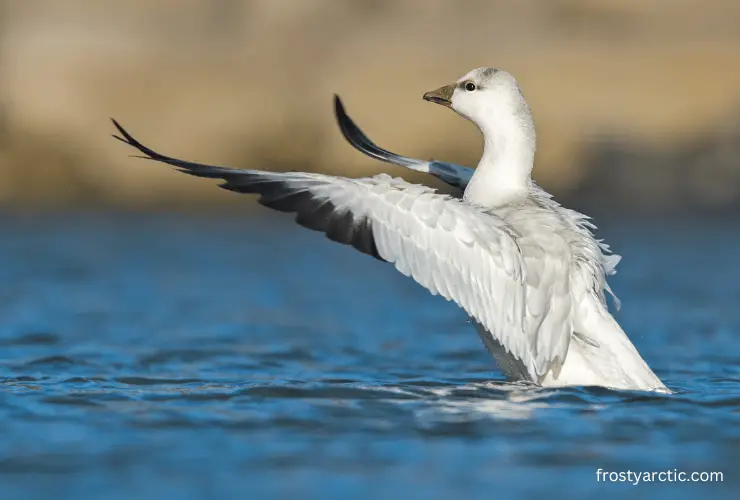Yes, snow geese can be aggressive, especially during their breeding season when they are protecting their nests and young. While these birds are generally docile and peaceful, they can become territorial and aggressive if they feel threatened or if their young are in danger.
In this article, I will uncover the factors that can trigger aggressive behavior in snow geese and explore the ways in which these birds defend themselves and their offspring. So, if you want to learn more about the fascinating behavior of snow geese, read on!
Are Snow Geese Aggressive or Smart?
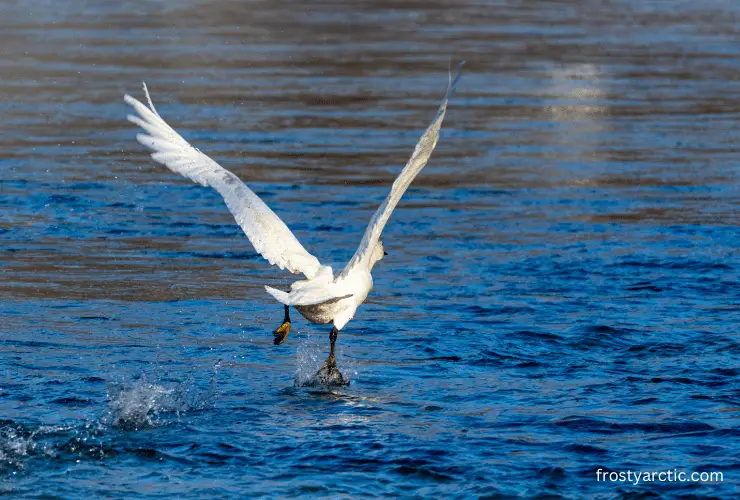
Snow geese are a species of North American waterfowl that are known for their intelligence and occasional displays of aggression. Research has found that snow geese use a complex system of signals and calls to communicate with each other, including using specific calls to coordinate their movements during migration.
A study published in the journal Animal Behaviour found that snow geese can recognize individual calls and adjust their behavior accordingly, demonstrating an impressive level of cognitive ability.
Why Are the Snow Geese So Aggressive?
There are several possible reasons why snow geese may show occasional aggression. Here are a few key factors that may contribute to this behavior:
1. Competition for Resources
Snow geese may become aggressive when competing for limited resources such as nesting sites.
According to the Study, aggressive interactions between snow geese were most likely to occur around nesting sites (Source).
Also, it is recorded that males were more aggressive than females.
2. Population Density
Higher population densities of snow geese may lead to increased aggression. Snow geese are more aggressive towards other waterfowl species. They also show this type of behavior towards individuals of their own species.
3. Breeding Season
Aggression among snow geese is most common during the breeding season when males compete for mates and defend their territory. However, aggressive interactions are relatively rare, and most interactions among snow geese are non-aggressive and involve social signaling and communication.
4. Defense of Offspring
Snow geese may become more aggressive when defending their offspring from predators or perceived threats. However, this behavior is typically limited to the breeding season and is not a significant cause of aggression among snow geese.
Are Snow Geese Aggressive To Humans
Snow geese can exhibit aggressive behavior towards humans in certain situations. As territorial animals, they may perceive humans as a threat and become defensive. Snow geese are particularly protective of their nests and young. They may become aggressive if they feel that they are being threatened.
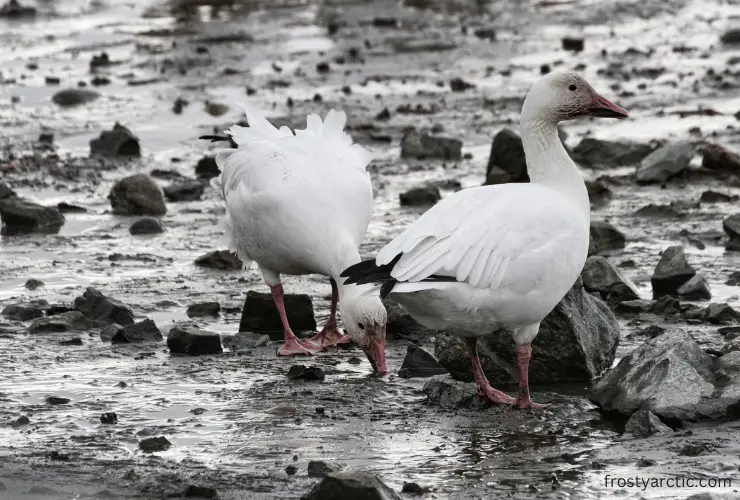
In such situations, they may hiss, flap their wings, charge, bite, or attack with their beaks, potentially causing harm to humans. In addition to their protective nature, snow geese can become aggressive if provoked, harassed, or feel that their personal space is being invaded.
However, it is important to note that snow geese rarely interact with humans. While other geese live alongside humans, snow geese live in arctic areas and try to stay away from people. But they can run into humans while searching for food. They usually do not attack humans unless provoked.
Does A Snow Goose Bite Hurt?
Snow Geese do have sharp, serrated bills that they can use to bite and tear at food. While a snow goose bite may not be as painful as a bite from a larger animal like a dog, it can still be painful and cause injury.
With their sharp bills, snow geese have strong necks and wings that they can use to strike out and attack perceived threats. When snow geese feel threatened or cornered, they may hiss, flap their wings, and lunge with their bills to drive away the perceived threat.
Are Snow Geese More Aggressive Than Ducks?
Some people may perceive snow geese as more aggressive than ducks due to their larger size and protective nature.
Snow geese have sharp beaks and strong wings, which they may use to defend themselves and their territory.
On the other hand, ducks are generally more social and less territorial and are not typically perceived as aggressive toward humans.
Are Snow Geese Friendly to Their Owners?
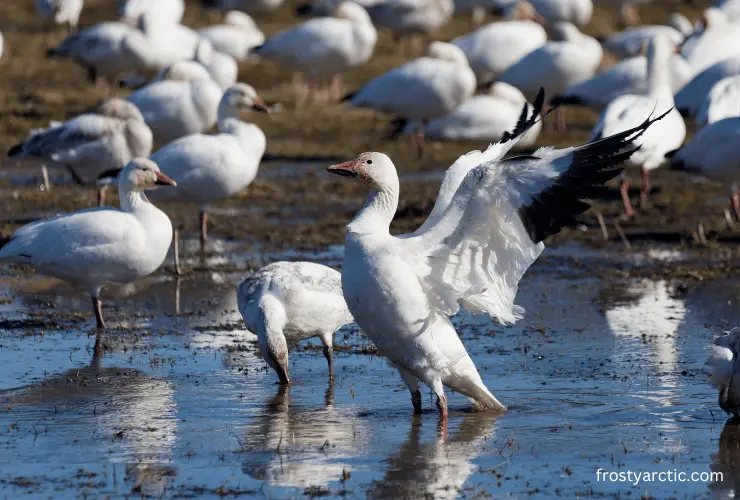
Snow geese do not make good pets, and humans do not domesticate them. They are wild animals, and farmers in many areas see them as pests.
Other species of geese can be friendly with their owners, but snow geese show a different behavior from them. That is why humans usually avoid owning them. In fact, in many states, capturing and owning a snow goose is illegal.
How Dangerous Are Snow Geese?
Snow geese use their beaks and wings to attack and may cause injury to humans.
According to the American Association of Orthopedic Surgeons, 22,000 reported injuries in the United States in 2009 caused by wild animals, including snow geese.
However, snow geese are wild animals and rarely interacted with humans in the past. But today, the animals have increased in numbers and often collide with humans who live near the Arctic and subarctic regions.
They mostly feed on crops and try not to bother humans. But when provoked, they can be quite aggressive and attack humans to defend themselves.
What To Do If a Snow Goose Hisses At You?
If a snow goose hisses at you, it’s a sign that the snow goose is feeling threatened or defensive. Here are some specific steps to follow if a snow goose hisses at you:
1. Stop and stand still
If a snow goose hisses at you, the first thing to do is to stop moving and stand still. This can help prevent the snow goose from feeling further threatened or provoked.
2. Back away slowly
As you stand still, begin backing away slowly from the snow goose. Do not turn your back on the snow goose, as this may be seen as a threat.
3. Give the snow goose space
As you back away, give the snow goose plenty of space to retreat. Do not try to approach or touch the snow goose, as this could be seen as a further threat and provoke it to attack.
4. Avoid disturbing their nests or young
If you are in an area where snow geese may have nests or are young, be careful not to disturb them. Snow geese can become especially protective of their young, so giving them plenty of space is essential.
5. Seek professional assistance if necessary
If you find yourself in a situation where a snow goose is acting aggressively toward you and feel that you cannot safely retreat, you may need to call for professional assistance. Animal control or a local wildlife rehabilitation center may be able to help.
Remember, snow geese are wild animals and can be unpredictable. It’s important to approach them cautiously and give them plenty of space to avoid potential conflicts.
Are Snow Geese Protected?
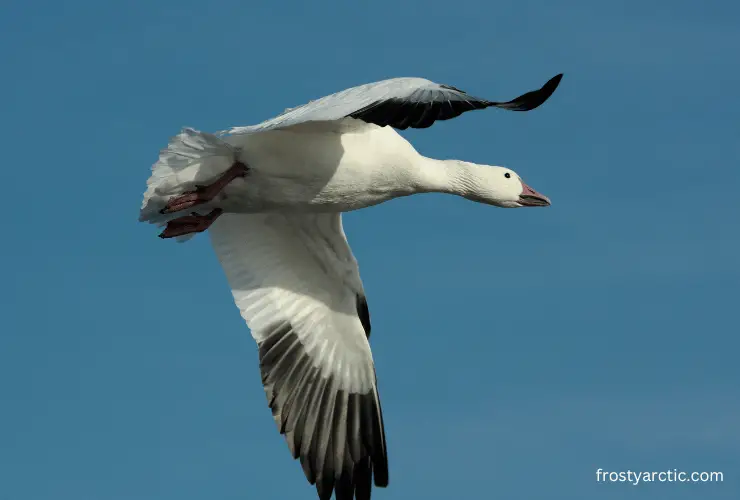
Yes, snow geese are protected under the Migratory Bird Treaty Act of 1918. This federal law makes it illegal to hunt, kill, capture and sell. This law aims to protect migratory bird populations and ensure their continued survival.
Some states and provinces may have additional regulations to protect snow geese, such as restrictions on hunting or bag limits.
It’s important to check local regulations before engaging in any activities that may affect snow geese or their habitats.
Can A Human Beat A Goose In A Fight?
While it’s possible for a human to overpower a snow goose in a fight physically, engaging in such a confrontation is not recommended or ethical.
Snow geese have sharp bills and strong wings that they can use to defend themselves, and a human could potentially be injured. It’s important to treat all animals with respect and avoid causing them harm or distress.
FAQ:
Can a snow goose break your arm?
It is unlikely that a snow goose could break a human arm, as their bills are not strong enough to exert that much force.
However, geese can deliver painful bites that could potentially cause bruising or other injuries.
My Final Word
Snow geese are naturally cautious and alert animals, and they can become scared or agitated by a variety of things. Some common things that may scare snow geese include loud noises, predators, threatening or aggressive human behavior, bright lights or flashing objects, and sudden or unfamiliar movements.
Reference:

